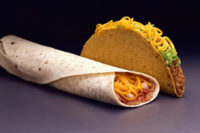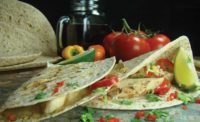
By Marina Mayer
For some tortilla producers, a tortilla is just a tortilla. Whether it’s made out of corn or flour, used as a component or eaten right out of the bag, these “small cakes” (as defined in Spanish), mean something different to all people.
To the folks at Don Pancho however, baking tortillas is an art that blends state-of-the-art equipment with experienced, passionate operators to create tortillas that almost taste like silk, says Ricardo Baez, president of Don Pancho Authentic Mexican Foods, Salem, Ore.
“One of the advantages that we have is that we really understand the world of tortillas and food and Mexican-related foods,” Baez says. “A lot of the things that we bring to the table is that we’re able to recognize that every product channel that you have has got to be viewed as a different entity using the same process that you have in place, but you have to be able to change your ingredients and change your processes to meet the needs of that specific area.”
That’s why these self-described tortilla confectioneers blend their knack for producing tortillas with sultry yet better-for-you ingredients to deliver specific recipes for the usage and application of tortillas, he adds.
In fact, Don Pancho creates a variety of low-carb, organic, multigrain and gluten-free corn and flour tortillas, wraps, tostadas and tortilla chips out of its Salem, Ore., headquarters, as well as its Salt Lake City, Utah, and Nashville, N.C., plants. They service schools, homes, quick-service restaurants, foodservice and even the military.
“When you look at the different tortilla profiles, it’s not just that we bake a corn tortilla or a flour tortilla,” Baez says. “It’s really knowing the depth of the whole package.”
Three years ago, the multimillion-dollar company purchased an 85,000-sq.-ft. facility in Halifax, N.C., to do just that – deliver the whole package.
“The goal of our company is to provide every household in the U.S. the opportunity to tasteDon Panchotortillas,” Baez says. “On a long-term platform, we want to be able to set up an infrastructure so that we can be able to provide a regionalized, national, fresh alternative to the consumer.”
Currently,Don Panchoproducts are sold in 43 states, with traditional 8- and 10-in. whole wheat flour tortillas being the top-selling products.
“Part of the reason why the 8-in. whole wheat or the 16-in. whole wheat tortilla shell has really taken off is the federal government has incorporated the tortilla into the Women Infants Children (WIC) program. [Created by the Food and Nutrition Service, the Alexandria, Va., division of USDA provides federal grants to states for supplemental foods, healthcare referrals and nutrition education for low-income pregnant, breastfeeding and non-breastfeeding postpartum women and to infants and children up to age five who are found to be at nutritional risk]. When you look at the demographic of the WIC user, it’s skewed toward Hispanics, and Hispanics tend to eat more tortillas,” Baez says.
Hispanics also are a somewhat sophisticated buyer, Baez adds, because they look for the integrity of the shell.
“They’re looking for a product that can be used in many different applications, including transporting all the meat for small tacos, the mini tacos, even for enchiladas or cutting them up and using them to scoop things up,” Baez says. “They have a definite perception and sophistication of the product because they’ve used them their whole lives. They may not be able to tell you what goes into it, but they know if it’s good when they eat it. They know that if it doesn’t meet those requirements that you have at the dinner table, you’re not going to have that repeat purchase.”
In addition to delivering sophisticated products, Don Pancho is aiming to provide better-for-you corn products to its ever-“growing” Hispanic consumers.
“The largest ethnic population in the U.S. that is a heavy consumer of corn tortillas [are Mexicans],” Baez says. “There’s a tremendous opportunity to get into the corn tortilla side of the equation and say, what can we do to help and provide a product that is better for those consumers in their daily diet so they have the alternative and the option to eat a tortilla that has more nutritional content than the current tortillas sold in the marketplace. That’s one of the areas that our team is discussing. We think that there’s not only a tremendous opportunity but a responsibility, especially for those of us who understand Hispanic-Mexican culture, to provide a tortilla that is a vehicle for better nutrition, for anyone that enjoys eating corn tortillas, but especially for Hispanics and Mexicans where it’s a staple.”
On the other hand, Don Pancho continues to penetrate the non-Hispanic buyers thanks in part to promotional advances such as end-cap displays, couponing, social media efforts and packaging changes. The market penetration rate for non-Hispanic buyers is around 49% or so, Baez says.
“[Tortillas are] one of those items that a household or whoever shops for the family, as they’re walking down the aisle, they may or may not have in mind that they’re going to eat Mexican food or use the tortilla and incorporate it into what they’re going to eat that week,” Baez says. “But if you find a way to [encourage] that consumer into making that choice, then that’s how you drive some of that category.”
That’s why its packaging efforts continue to evolve by reflecting attributes of the product, such as trans-fat free, no cholesterol and gluten-free, which are essential to including on the front of the pack.
“Quality, consistency and product integrity. When [consumers] pick up our brand, it’s our expectation that they’re going to have a quality product that is consistently manufactured that can help them pursue whatever foods and however they want to intake it,” Baez says. “That’s really what we stand for. When you find this correlation with that brand that you’re buying, you have found your sweet spot. We want Don Pancho tortillas to be all those things, and that’s what we stand for.”
Sweet success
Also what Don Pancho stands for is a replication of what it’s always represented.
For instance, Don Pancho started as Puentes Bros. in the 1950s in San Jose, Calif. The founder, Francisco Puentes, Sr., and his wife expanded the company and opened a division in Oregon to be close to his family and children.
“Part of that was that there was a lot of migration from Hispanic workers who used to go up from the valley to Oregon and wanted to do migrant work, and they couldn’t find a fresh tortilla back in those days. So he thought it would be a good opportunity for him,” Baez says. “He had a lot of people come into his facility, buy fresh cases of tortillas, put them in their trucks and then just drive off to Oregon because everything they could find was frozen.”
In 1979, Puentes Bros. launched the Don Pancho brand and changed the company name to Don Pancho Authentic Mexican Foods in honor of Francisco, or Don Pancho as he was nicknamed.
Then, 10 years ago, Don Pancho formed a relationship with Reser’s Fine Foods, based in Beaverton, Ore. Reser’s, a distributor of Stonemill Kitchens dips and Mrs. Kinser’s cheese spreads, salads, side dishes and more, maintained a strong distribution center for tortillas, thanks to its own line of Baja Café tortillas, salsas, taquitos, enchiladas and hand-rolled burritos.
“They didn’t have any expertise in baking tortillas so we were competing amongst one another,” Baez says. “But we found one thing in common: they had great distribution, we had great product, so we thought we’d do a great thing and just combining that together.”
Fast forward to now. Don Pancho is a separate entity of Reser’s that operates independently under the same umbrella in their food family, Baez says. Doing so has enabled Don Pancho to leverage Reser’s purchasing power and connections in exchange for its expertise in tortilla manufacturing.
For example, every sales channel maintains its own dedicated sales strategy.
“The requirement of a foodservice operator versus a retail channel is completely different,” Baez says. “They’re related but they’re different, and unless you provide a specific forum for filling that need, you’re going to fall short. Every channel that you have, you have to be able to understand and you have to be able to add value to that, and the value proposition that you have on each one of them is completely different.”
Currently, 45-55% of Don Pancho’s products are sold in foodservice retailers thanks in part to its vast distribution system. Together, Don Pancho and Reser’s share about 125 routes and main-line distributors, Baez adds.
“We have dedicated tortilla distribution for those who only want to engage in tortilla distribution and we have our own trucks who deliver to specific geographic locations,” he says.
And, when one door closes, another one opens for the folks at Don Pancho. That’s why they continue to successfully craft challenges into opportunities.
In fact, challenges are opportunities, Quirarte says.
“Every time that we face a challenge, we have the opportunity to learn and train the team members how to fix the challenge and how we learn for future growth,” he adds.
A recipe that calls for better-for-you products and a team of visionaries help the folks at Don Pancho to be the ultimate tortilla confectioneers.







